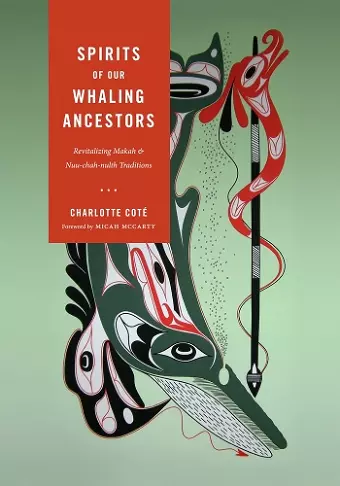Spirits of Our Whaling Ancestors
Revitalizing Makah and Nuu-chah-nulth Traditions
Format:Hardback
Publisher:University of Washington Press
Published:21st Jul '15
Currently unavailable, and unfortunately no date known when it will be back
This hardback is available in another edition too:
- Paperback£24.99(9780295990460)

As a member of the Nuu-chah-nulth First Nation, Charlotte Coté offers a valuable perspective on the issues surrounding indigenous whaling, past and present.
Following the removal of the gray whale from the Endangered Species list in 1994, the Makah tribe of northwest Washington State announced that they would revive their whale hunts; their relatives, the Nuu-chah-nulth Nation of British Columbia, shortly followed suit. Neither tribe had exercised their right to whale - in the case of the Makah, a right affirmed in their 1855 treaty with the federal government - since the gray whale had been hunted nearly to extinction by commercial whalers in the 1920s. The Makah whale hunt of 1999 was an event of international significance, connected to the worldwide struggle for aboriginal sovereignty and to the broader discourses of environmental sustainability, treaty rights, human rights, and animal rights. It was met with enthusiastic support and vehement opposition.
As a member of the Nuu-chah-nulth Nation, Charlotte Cote offers a valuable perspective on the issues surrounding indigenous whaling, past and present. Whaling served important social, economic, and ritual functions that have been at the core of Makah and Nuu-chahnulth societies throughout their histories. Even as Native societies faced disease epidemics and federal policies that undermined their cultures, they remained connected to their traditions. The revival of whaling has implications for the physical, mental, and spiritual health of these Native communities today, Cote asserts. Whaling, she says, “defines who we are as a people.”
Her analysis includes major Native studies and contemporary Native rights issues, and addresses environmentalism, animal rights activism, anti-treaty conservatism, and the public’s expectations about what it means to be “Indian.” These thoughtful critiques are intertwined with the author’s personal reflections, family stories, and information from indigenous, anthropological, and historical sources to provide a bridge between cultures.
A Capell Family Book
"Spirits of Our Whaling Ancestors will appeal to a wide audience. Natives and non-Natives . . . North American historians . . . Environmental and legal scholars . . . The cohort belonging to the emerging field of food studies. . ."
-- Rachel Herrmann * Pacific Northwest Quarterly *"A relatively small book of potentially immense importance. The central issue it covers . . . is one that resonates with attempts by indigenous people worldwide to maintain their customary subsistence patterns."
* Indigenous Peoples Issues and Resources *"An examination of the issues surrounding indigenous whaling, brought into the public spotlight when the Makah tribe of Washington and the Nuu-Chah-Nulth nation of British Columbia decided to resume whale hunting."
* Seattle Times *"Cote does an excellent job of tracing the various strands that led up to the 1999 Makah hunt and includes a cultural overview and background as well as politco-legal and environmental contexts. . . As a member of the Nuu-chah-nulth First Nation and a descendent of a prominent whaling lineage, the information she has access to and the insights it provides make this book unique."
* ChoiISBN: 9780295996813
Dimensions: unknown
Weight: 735g
288 pages